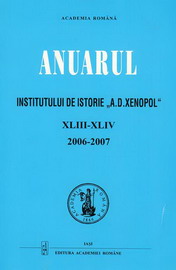România în politica sud-est europeană a Marii Britanii, septembrie 1939 – februarie 1941
Romania in the Great Britain's South-Eastern European Policy, September 1939-February 1941
Author(s): Bogdan-Alexandru SchiporSubject(s): History
Published by: Editura Academiei Române
Keywords: total war; neutral state
Summary/Abstract: Along with the beginning of the war, in September 1939, Romania played a less important role in Great Britain general strategy. At this fact contributed, in a significant measure, the evolution of the internal policy, the equilibrium between the internal political forces constantly influencing the Great Britain’s possibilities of action, who finally decided, in February 1941, to withdraw its diplomatic mission from Bucharest and the consulate’s employees. In the period of which we refer, Romania firstly became for the British the theatre of an economic war of which main objectives were the disorganization of the enemy’s economy and preventing the enemy from continuing the war. The London’s actions in this direction can not be analyzed without considering the fact that the world was in the age of “total war”, and, in this context, Great Britain was hardly trying to impose an efficient blockade against Germany. Even Romania was a neutral state, she provided very important row materials to the third Reich so that the Great Britain’s actions can be justified. Secondly, we have to consider, among others, the general evolution of the war and the Great Britain’s attempts to approach to Italy and Soviet Union to gain them for its side. From this point of view the relations between Romania and Great Britain also concentrated in the direction of organizing a bloc of neutrals or a Balkan bloc, capable of opposing the German or Soviet expansion. So, in the period at witch we refer, the relations between Great Britain and Romania were not bilateral in the first place, but tended to be a reflex of the attitude of those two states both to Germany and Soviet Union. From this point of view the Romanian and British perspectives upon bilateral relations differs in a significant measure. But if the Romanian perspective is better known to us, the British one was less researched and analyzed in Romania. Our study is trying to supply this gap, by defining a British image upon Romania in the period between September 1939 and February 1941, maybe different from those reflected by the bilateral relations, but no less important. A better understanding of the role played by Romania in the south-eastern European British policy and the motivations which dictated the line of this policy, both on economic and diplomatic coordinates, can contribute to a better understanding of the political evolution in the south-east Europe thenceforth.
Journal: Anuarul Institutului de Istorie »A.D. Xenopol« - Iaşi
- Issue Year: 2006
- Issue No: 43+44
- Page Range: 421-434
- Page Count: 13
- Language: Romanian

